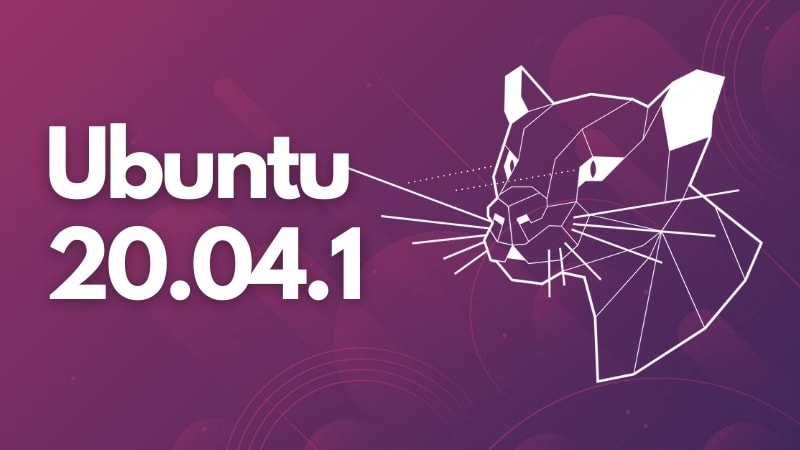The first point release of Ubuntu 20.04 LTS is finally here. You can now download Ubuntu 20.04.1 LTS.
What is point release? Is Ubuntu 20.04 different than Ubuntu 20.04.1?

This could be confusing if you are new to Ubuntu. Ubuntu 20.04 long term support (LTS) version was released in April this year.
Since a LTS release is supported for five years, providing the same installation media (ISO) for five years won’t be a wise thing to do.
Imagine trying to install Ubuntu 20.04 in 2022. You’ll have a huge list of system updates, security updates, software updates and bug fixes to install right after you have a fresh install of Ubuntu.
Installing several GB of update data can be avoided thanks to these point release.
The Ubuntu team refreshes the ISO of Ubuntu 20.04 with all the bug fixes and important updates released since April 2020. There will be up to 5 more point releases for Ubuntu 20.04 in the future.
Anyone downloading Ubuntu 20.04 now will be downloading Ubuntu 20.04.1 ISO (until the next point release)
If I am using Ubuntu 20.04 LTS, do I need to do something to get Ubuntu 20.04.1?
If you are using Ubuntu 20.04 already, you don’t need to download ISO of 20.04.1 and install it again.
Instead, just keep your Ubuntu system updated and you’ll be using Ubuntu 20.04.1 automatically. I mean, it’s not a fresh release. It just regular system update for you.
If you check your Ubuntu version after updating your system, you should see it in the description:
abhishek@itsfoss:~$ lsb_release -a
No LSB modules are available.
Distributor ID: Ubuntu
Description: Ubuntu 20.04.1 LTS
Release: 20.04
Codename: focalWhen a new Ubuntu LTS version is released, some cautious users wait for the availability of the first point release instead of upgrading right after the release.
This helps them avoid all the bugs that could be discovered right after the release.
Ubuntu 20.04.1: What’s New?
Now you know that point release of an LTS version does not include any major functional changes. So, here, you should expect important bug fixes and security updates.
Let’s take a brief look at it:
Easy Upgrade to Ubuntu 20.04 LTS from Ubuntu 18.04 LTS
Not really a “change” — but the first point release of Ubuntu 20.04 LTS also enables the prompt on Ubuntu 18.04 LTS that will let you upgrade to Ubuntu 20.04 LTS in a click.
So, for Ubuntu 18.04 users, you no longer need to manually use the terminal or update manager to upgrade, it’s easier than ever now.
Installation Bug Fixes
There were some known installation issues (or bugs). With Ubuntu 20.04.1, a lot of Installation bugs were fixed that also includes the support for new NVIDIA drivers.
So, the updated ISO file should prove to be a breeze to install if you had issues installing Ubuntu 20.04 LTS initially.
Upgrade Bug Fixes
Ubuntu’s update manager wasn’t perfectly fine with its Ubuntu 20.04 LTS release. However, with the latest point release, several upgrade bugs have been fixed which should make it easier to upgrade to later releases without issues.
Desktop Bug Fixes for Ubuntu-based Systems
For desktop systems running Ubuntu 20.04 LTS (GNOME edition) or the official flavours Kubuntu, Ubuntu MATE 20.04, and others — several bug fixes and updates are in place.
For instance, nautilus (file manager), gnome-desktop, and libreoffice were updated to its latest stable version available.
Several bugs were also fixed that revolved around the GNOME control center and GNOME shell.
Server and Cloud System Fixes
This is something that shouldn’t matter to the desktop users — but if you have a server or a cloud instance running on Ubuntu 20.04, there are a lot of fixes for it as well.
I’m not an expert here — but I can see updates/fixes to cloud-init, open-vm-tools, and a couple other important packages.
Other changes
There’s no “new” hardware support but attention has been given to improve the support for specific items of hardware.
Improved support for Wireguard, Intel Tiger Lake processor, OEM kernel, and a lot of technical fixes in general.
If you want to learn all the technical details for every fix/update in this point release, you might want to check the official release notes and security notices.
Wrapping Up
If you were one of the cautious users waiting for the first point release, the wait is finally over.
You can go ahead and upgrade Ubuntu 18.04 to 20.04 or get the latest ISO from Ubuntu’s official download page for desktop.
I’ll put the features of Ubuntu 20.04 so hat you can have a quick look in this video:
Were you waiting for the first point release or are you already using Ubuntu 20.04?
[interaction id=”5f2d3e2747b5982952ee0655″]

